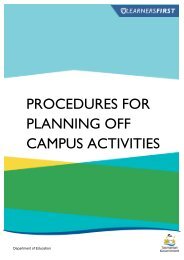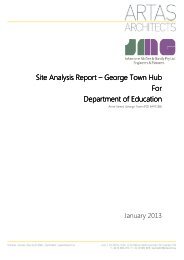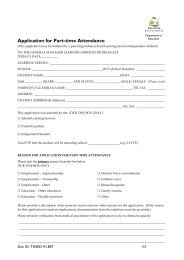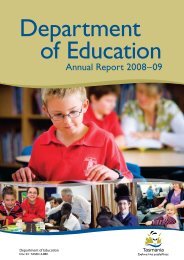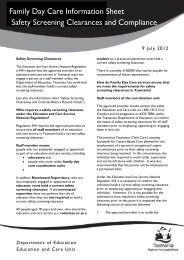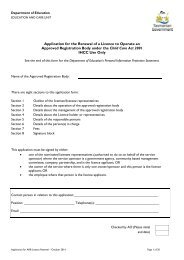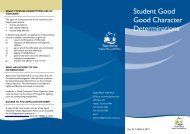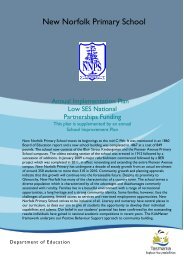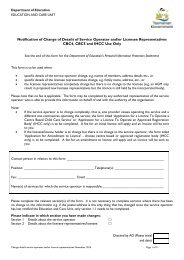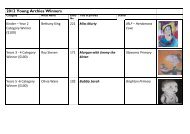Tas Curriculum K-10 - Languages - Italian - Department of Education
Tas Curriculum K-10 - Languages - Italian - Department of Education
Tas Curriculum K-10 - Languages - Italian - Department of Education
You also want an ePaper? Increase the reach of your titles
YUMPU automatically turns print PDFs into web optimized ePapers that Google loves.
Standard one Standard two Standard three Standard four Standard five<br />
Adjectives<br />
Rehearsed use <strong>of</strong> some<br />
common, regular forms<br />
with gender awareness<br />
e.g. bravo / brava, bello<br />
/ bella, grande, bene,<br />
male, blu, rosso / rossa<br />
Adjectives<br />
Initial awareness <strong>of</strong><br />
regular forms and<br />
initial awareness <strong>of</strong><br />
gender and number e.g.<br />
bambino / a, bambini /<br />
e, azzurro / i, alto / a / i<br />
/ e, fantastico / a,<br />
ottimo, felice<br />
Initial awareness <strong>of</strong><br />
position e.g. la<br />
bicicletta rossa<br />
Initial awareness <strong>of</strong><br />
possessives e.g. il mio<br />
libro, la mia famiglia<br />
Awareness <strong>of</strong><br />
interrogative adjectives<br />
e.g. che? chi? come?<br />
dove? perche? quando?<br />
quanti? com’è?<br />
Adjectives<br />
Recognition <strong>of</strong> an<br />
increasing range <strong>of</strong><br />
adjectives and<br />
developing<br />
understanding <strong>of</strong><br />
gender and number<br />
agreement e.g. felice,<br />
triste, stanco,<br />
simpatico, gentile,<br />
brutto, italiano / a,<br />
sudanese<br />
Recognition <strong>of</strong><br />
possessives e.g. il mio,<br />
la tua, i miei, le tue, i<br />
tuoi<br />
Awareness <strong>of</strong> position<br />
<strong>of</strong> regular adjectives<br />
after the noun and<br />
agreement with the<br />
noun e.g. un ragazzo / a<br />
alto / a, due ragazzi / e<br />
alti / e<br />
Awareness <strong>of</strong><br />
interrogative adjectives<br />
+ verb e.g. che cosa è?<br />
che dici? chi viene?<br />
quanto costa?<br />
Awareness <strong>of</strong> common<br />
adjectives that precede<br />
the noun e.g. bello,<br />
buono, bravo, brutto<br />
Adjectives<br />
Agreement <strong>of</strong> number<br />
and gender with noun<br />
Common adjectives<br />
that precede the noun<br />
and their forms e.g.<br />
buon, buono, buon’,<br />
buona, buone, bel, bell’,<br />
bello, bella, bei, belle,<br />
begli<br />
Forming the plural <strong>of</strong><br />
adjectives that end in<br />
–ca, –ga, –go, –io e.g.<br />
simpatico / ci, bianca /<br />
che, larga / ghe, largo /<br />
ghi, vecchio / vecchi,<br />
grigio / grigi<br />
Possessive adjectives<br />
e.g. il suo, la sua, i suoi,<br />
le sue<br />
Interrogative adjectives<br />
e.g. come? dove?<br />
perche? quando?<br />
com’è?<br />
Variable interrogatives<br />
e.g. quale? quanto?<br />
Possessives when<br />
talking about family e.g.<br />
la mamma, il papa, mia<br />
sorella, mio fratello, il<br />
mio caro padre<br />
Adjectives<br />
All forms <strong>of</strong> possessives e.g. il vostro,<br />
il loro<br />
Demonstrative e.g. questo, quello<br />
Recognition <strong>of</strong> comparative e.g.<br />
piu’ buono, meno di, uguale a,<br />
meglio di, un migliore studente,<br />
peggiore, maggiore, minore<br />
Recognition <strong>of</strong> superlative e.g. il /<br />
la migliore, il / la peggiore, il / la<br />
minore<br />
Variable interrogatives e.g. quale<br />
/ i? quanto / a / i / e? + noun<br />
Adjectives ending in -ista and<br />
their plurals e.g. ottimista<br />
15



